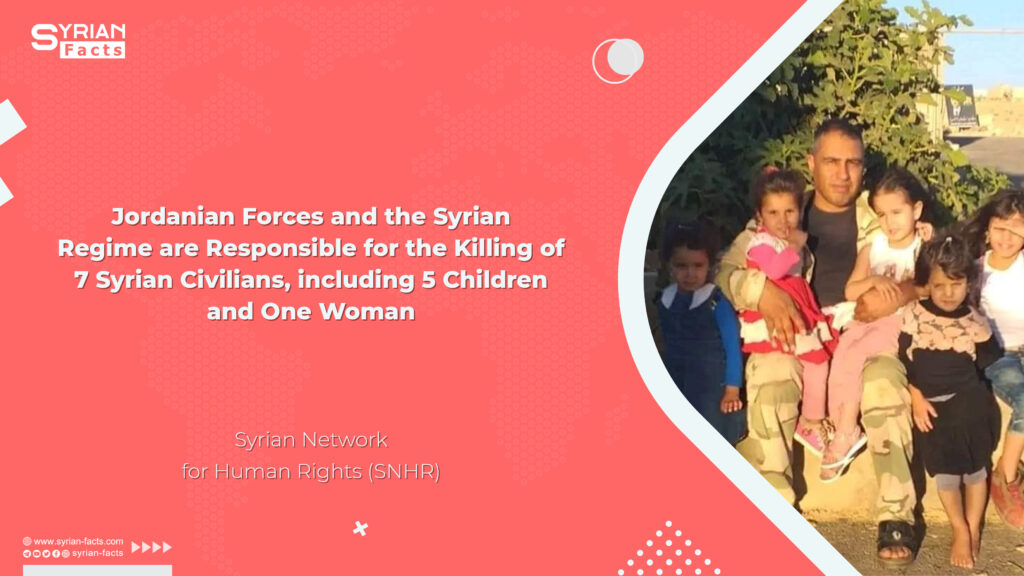The Hague – The Syrian Network for Human Rights (SNHR) today released a report entitled, ‘Jordanian Forces and the Syrian Regime are Responsible for the Killing of Seven Syrian Civilians, including Five Children and One Woman’, in which the group notes that the Syrian regime is hiding Captagon traffickers among the Syrian people, and that Jordanian forces must respect international law.
According to the report, two warplanes, both of which, SNHR suspects, are affiliated with the Royal Jordanian Air Force (RJAF), entered Syrian airspace from Jordan before carrying out two simultaneous attacks on two targets in southern Syria. The first attack took place near Kharab al-Shahm town in the western suburbs of Daraa governorate near the Jordanian-Syrian border. The targeted site was formerly a regime sewage treatment plant. At the time of the airstrike, which destroyed some buildings in the facility, the site was under the control of armed groups affiliated with Syrian regime forces and the Lebanese group Hezbollah. The report documented no civilian casualties from the airstrike, with the targeted site being under the control of combatants with no civilian presence. Meanwhile, the second attack was carried out against al-Sha’ab village in the far southeast of Suwayda governorate. The targeted site was a residential home occupied by the family of Mer’ie Ruwyshed al-Ramthan, a local from the village. Al-Ramthan, who is believed to have been the head of a massive drug trafficking network in southern Syria responsible for distributing Captagon and other narcotics, was a key figure responsible for recruiting and arming smugglers across the south of the country. He commanded a local armed militia whose manpower is estimated to number in the hundreds, centered in the desert ‘badiya’ of Suwayda, where it controls a number of areas. This militia is responsible for securing the trafficking routes and overseeing operations involving the transportation and smuggling of Captagon and other narcotics, as well as arms, in coordination and collaboration with the Syrian regime’s ‘al-Ferqa al-Rabe’a’ (Fourth Division), headed by Major General Maher Assad, brother of the head of the Syrian regime, Bashar Assad.
The report documented the killing of seven civilians in this airstrike, identified as: Mer’ie, his 36-year-old wife Hend al-Ramthan, and their five children whose ages ranged from two to 10 years old.
The report stresses that, given the highly centralized nature of the Syrian regime, it would be impossible to operate a narcotics-production and distribution network of such a massive scale as the one currently operating in areas under its control without its central approval and supervision. SNHR further notes in the report that it is an absurd notion to cooperate with the entity responsible for producing and distributing Captagon in operations to combat the same Captagon production networks, adding that Mer’ie al-Ramthan was just one of a large network of dozens of drug traffickers, all of whom operate under the command of the Syrian regime and Hezbollah. Killing any one of these figures will not put an end to Captagon production, with others quickly emerging to take their place.
The report also stresses that the Syrian regime and Hezbollah bear responsibility for hiding Captagon and narcotics traffickers among Syrian civilians, effectively endangering the lives of their families and of the local residents living in and around those areas. Further, the report notes that Jordanian military forces are responsible for killing civilians, including children, due to their failure to respect the principle of proportionality established in international law, which requires that, in determining the legitimacy or lack thereof in any attack, the attacking party should first assess the context. Any attacks that “may be expected to cause incidental loss of civilian life, injury to civilians, damage to civilian objects, or a combination thereof, which would be excessive in relation to the concrete and direct military advantage anticipated, is prohibited.” There must be always a balance between the means, the end, and the actual outcomes. SNHR has extremely strong indicators which suggest that the damage inflicted in this case was exceptionally excessive compared to the anticipated military advantage.
The report calls on the Security Council to adopt a resolution obliging the Syrian regime to cease the production of and trade in Captagon and other narcotics, and imposing strict UN sanctions in cases of non-compliance. Moreover, the report calls on the international community to take action against the Syrian regime and Hezbollah through every means possible, considering the fact that the production of Captagon and other addictive narcotics poses a threat to all the peoples of the world, and to renew pressure on the Security Council in order to refer the situation in Syria to the International Criminal Court (ICC).
The report also calls on the Jordanian government to launch an investigation into this incident which resulted in the killing of civilians, including children, to make the findings of this investigation available to the public, and to end all forms of coordination with the Syrian regime that is the producer, manufacturer and distributor of Captagon. SNHR emphasizes that this failed policy of coordinating with the Syrian regime is the reason for this horrifying massacre.
The report also makes a number of other recommendations.





Be the first to write a comment.